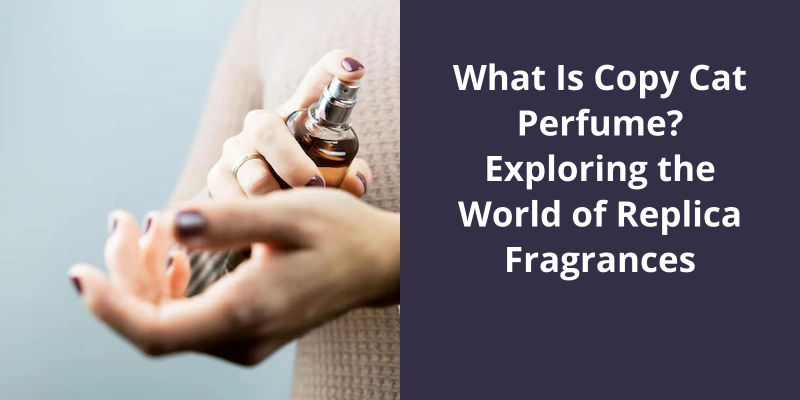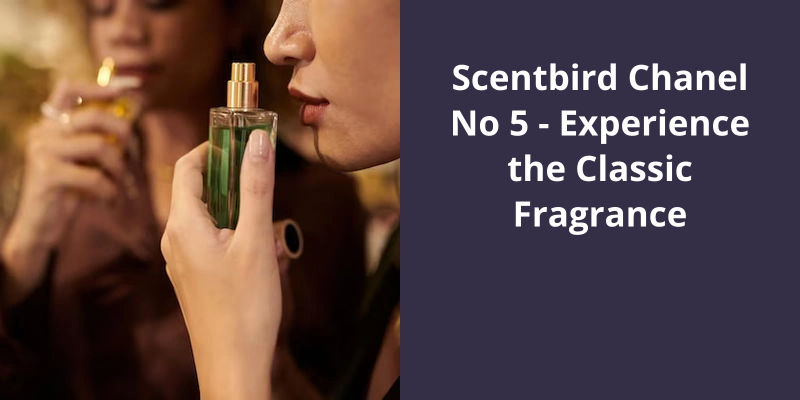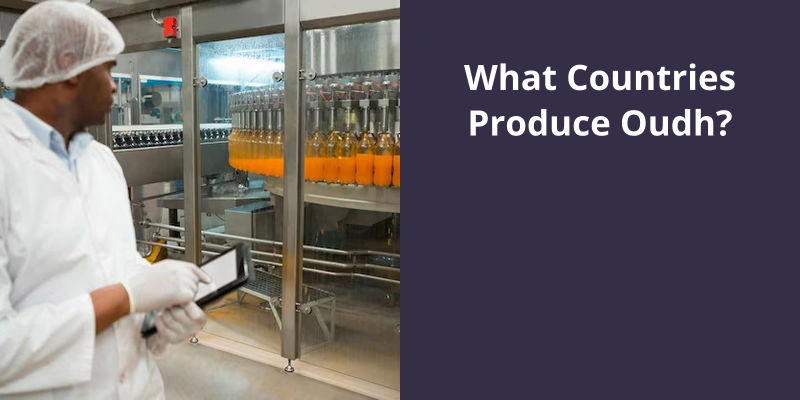Copycat perfume is a term used to refer to fragrances that are designed to smell like high-end, designer scents but are sold at a much lower price. These are also referred to as imitation, replica, or knock-off perfumes. They are made by dissecting the original scents into their basic components and then replicating them with cheaper ingredients. While they might not have the same longevity or exact scent profile as the original, they offer a similar sensory experience. It’s an affordable way for perfume lovers to enjoy the scent of a luxury fragrance without spending a fortune. These scents are usually legal unless they breach copyright laws by too closely copying the original packaging or branding.

Are Fake Perfumes Legal?
In recent years, perfume cloning has become increasingly popular in many countries. The process involves creating a replica of an existing fragrance and selling it under a different brand name or label. While some may think that this is illegal, the truth is that as long as certain rules are followed, perfume clones are completely legal.
This means that anyone can create a similar scent, as long as they don’t use the original brand name, logo, packaging, or bottle. By doing this, they aren’t infringing on trademark or copyright laws.
Fortunately, there are ways to differentiate between real and fake perfumes. One of the most obvious signs is the price. If a perfume is being sold for a significantly lower price than it’s original counterpart, it’s most likely a fake. Additionally, the packaging and design may look similar, but there are often small differences that can be easily spotted by a discerning eye.
It’s important for consumers to be aware of what they’re purchasing.
However, it’s important to note that copy perfumes aren’t just limited to imitating high-end designer fragrances. In fact, many copy perfumes are inspired by popular scents from various brands and are often created to cater to a specific market or demand. These variations can sometimes differ significantly from the original, offering a unique and affordable alternative.
What Is a Copy Perfume?
In the world of fragrance, copy perfumes have become increasingly popular in recent years. These perfumes are essentially replicas of popular fragrances, designed to mimic the scent of a well-known fragrance, without carrying the original brand name. Copy perfumes are often much cheaper than the original, allowing consumers to enjoy their favorite scents without breaking the bank.
The perfumers and fragrance houses that create these fragrances are often skilled and experienced in their field, ensuring that the final product is of a very high standard.
Original perfumes can be very expensive, especially if they’re from a well-known brand or designer.
This means that consumers aren’t limited to purchasing their fragrance from a single retailer, but can instead shop around for the best deals and prices.
Because they’re often much cheaper than the original fragrance, consumers can try out a variety of different scents without having to commit to one particular brand or fragrance. This can be especially helpful for those who’re new to the world of fragrance, allowing them to experiment and find the perfect scent for their personality and style.
The Ethics and Legality of Copy Perfumes: Is It Legal to Make Copy Perfumes? What Are the Ethical Implications of Creating Replicas of Popular Fragrances?
This topic explores the legality and ethics of producing copy perfumes. It questions whether it’s legal to create replicas of popular fragrances and considers the ethical implications of doing so.
Now that we’ve a basic understanding of inspired perfumes, let’s explore the key differences between these and their designer counterparts.
What Is the Difference Between Perfume and Inspired Perfume?
Perfume and inspired perfumes are both fragrances people use. Perfumes are created using specific notes and ingredients to produce unique scents. Brands invest significant time and resources into testing and perfecting their scents to create the optimal fragrance experience. They’re popular because they’re sold at much lower prices than the original brands, making them accessible to people who can’t afford the expensive names.
There are legal limitations when it comes to marketing, selling and branding inspired perfumes. For ethical and legal reasons, inspired perfume companies can’t use brand names of original perfume products, or even claim they sell the same exact perfume, even though they smell the same. They can only use the words “Inspired by” to indicate the connection between the original brands perfume and their fragrance. Such limitations help to protect the intellectual property rights of the original brands.
It all boils down to individual preference – some people prefer to pay the premium price for the luxury of brand names, while others prefer to spend less on similar fragrances and enjoy perfume without the hefty price tag.
While perfume dupes are legal and can be a more affordable option for those who want to smell like their favorite high-end fragrance, there are some potential downsides to consider. The quality of ingredients used in the imitation fragrances may not always be up to par with the original, resulting in a less desirable scent and weaker staying power. This begs the question, are perfume dupes bad? Let’s take a closer look.
Are Perfume Dupes Bad?
Furthermore, perfume dupes can also be harmful to the health of the user. These knockoff fragrances may contain chemicals that haven’t been properly tested or approved for use in personal care products. Some can even cause skin irritation or other allergic reactions. It’s important to remember that not all fragrance ingredients are safe or suitable for everyone, and that lower-cost dupes may not have undergone the same rigorous safety testing as the originals.
Many people argue that purchasing counterfeit products is equivalent to stealing from the original creator or company, as they aren’t receiving compensation for their work. This can harm the livelihoods of independent perfumers or small businesses that rely on the sale of their original fragrances to make a living. Additionally, the production and distribution of counterfeit products often involves illegal and unethical practices, such as sweatshop labor, environmental pollution, and funding of organized crime.
Finally, the rise of perfume dupes has had a significant impact on the fragrance industry as a whole. The demand for cheaper knockoffs has led to a proliferation of imitators and copycats, who may be less invested in creating original and distinctive fragrances. This can stifle creativity and innovation in the perfume world, as designers may be discouraged from taking risks or exploring new ideas.
How to Spot a Perfume Dupe and Avoid Purchasing One
Perfume dupes are imposters of the original fragrances but made with cheaper ingredients. To avoid purchasing a perfume dupe, always seek authentic fragrances from authorized dealers, look out for variations in the packaging, and do a smell test to detect inconsistencies in the fragrance.
In order to avoid the potential hazards of fake perfumes, it’s important to know how to spot a knock-off and what to do if you’ve accidentally purchased one. Not only can it be a waste of money, but it could also be dangerous to your health. Let’s explore the reasons why buying knock-off perfumes is a risky proposition.
Are Knock Off Perfumes Bad?
So, one must exercise caution when it comes to purchasing knock off perfumes. Not only do you run the risk of buying a fragrance that may not smell pleasing, but you may also be risking your health and well-being by exposing yourself to harmful chemicals and allergens in the ingredients. The composition of counterfeit perfumes is often done with subpar materials that aren’t up to par with the industry standards. Even worse, these perfumes may contain toxic substances that can cause serious harm to your skin and other body parts.
Furthermore, when you use an imitation perfume, you run the risk of the fragrance fading away quickly and leaving an unpleasant scent or no scent at all. Authentic fragrances are crafted to evolve over time, revealing different notes and nuances as the day goes on. Knock off perfumes, on the other hand, are created to mimic the initial fragrance, but they’re often unable to maintain the scent for long periods. This can leave you feeling disappointed and frustrated. It’s essential to remember that genuine perfumes are worth the investment because they offer a unique sensory experience that can’t be replicated by counterfeit products.
How to Spot Knock Off Perfumes: Tips and Tricks for Identifying Fakes
- Check the packaging: Genuine perfumes will have high-quality packaging with a secure seal and a clean and crisp label.
- Inspect the bottle: Look at the bottle for any inconsistencies or imperfections, such as uneven glass thickness or crooked labels.
- Examine the color: If the perfume is significantly lighter or darker than the original, it’s likely a knock off.
- Smell the perfume: Fakes often have an off-putting or diluted scent that doesn’t match the original.
- Check the price: If the price seems too good to be true, it probably is. Authentic perfumes are typically sold at a consistent price.
- Buy from a reputable source: Only purchase perfumes from authorized dealers or legitimate retailers to avoid buying fakes.
Conclusion
In conclusion, the term "Class A" when it comes to perfumes refers to the concept of a copycat product that imitates the scent of a high-end perfume brand. While some may view these perfumes as a cheap alternative to expensive fragrances, the reality is that they’re counterfeit products and often violate trademark laws. It’s important to be aware of the authenticity of the products you purchase, not only to support ethical business practices but also to ensure that you’re getting the quality and longevity you deserve. As consumers, we’ve the power to make informed decisions and promote transparency in the industry.





